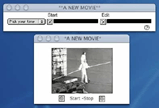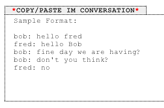:: Sunday, March 07, 2004 ::
 E X T E N D E D . F E A T U R E
E X T E N D E D . F E A T U R E
NEW WRITING: no/copy/right
BY: Garrett Lynch
EXCERPT: no/copy/right is an online exhibition that has just been opened by no-org.net, a "new Jerusalem art network envisioned as a platform for experimental projects in the area of netbased and digital art and for the exchange of independent information on contemporary art."
Subsequent to a call for works on the theme of anti / counter copyright which went out through most mailing lists at the start of this year for a new net.art 'space' completely unknown to the community, I have been regularily checking the site to see how well the exhibition fared. It's a shame but many online exhibition ‘spaces’, which have had promising debuts, have not been in successive exhibitions or have quite simply been pushed out by the mainstream art world.
click here for the complete article.
"no/copy/right" by Garrett Lynch will be featured through 4 April 2004.
 ORIGINAL POST: Mon Feb 23, 02:49:52 AM
ORIGINAL POST: Mon Feb 23, 02:49:52 AM BY: Eduardo Navas
Turbulence.org is currently featuring reimaginings by ikatun.org, a collaborative project dependent on submissions of Instant Messaging conversations between two people. Inspired by Newton and his seven-color spectrum, Ikatun aims to expand the possibilities of the "classical" spectrum based on user submissions.
By doing this, the project plans to reevaluate the sharing of "information packets" across the internet, as Ikatun explains:
/reimaginings/ is a critique of the current culture of data visualization, hyperlinking and relationship mapping. Databases, visual graphing tools, and other internet technologies have made it possible to connect any packet of data to any other packet of data. The illustration of these relationships through research papers, graphs, animations and dramatic reenactments is often a display of technical wizardry designed to assert the importance of the case being made and to intimidate with complexity and rhetoric.
And raises these questions:
Who makes the decisions about how meaningful relationships between data points are constructed? Who designs the database and the user survey? Who writes conclusions? More than anything, who transforms data into information? /reimaginings/ makes the case that these functions are anything but neutral in a world of information overload.
reimaginings looks very promising. The project, however, needs major input from the community to be developed. So log on and make some art.
 ORIGINAL POST: Mon Feb 23, 07:02:28 AM
ORIGINAL POST: Mon Feb 23, 07:02:28 AMBY: Peter Luining
As a response to Eduardo Navas's text about ikatun.org’s work reimaginings (see above), here are some thoughts about projects that need user input.
First off, I did such a project by myself. Or better, I started a project (called ZNC browser) and, after some time, people began to start doing pages especially made for it. When I received several, different, spontaneously-made contributions, I decided to put up a special submission page. I tell this as an introduction because I think--especially in the art arena--a lot of people are doing or think about doing community-based works, but they’re not totally aware that it’s not so easy for a lot of visitors to provide input or content on the work. As far as I know, there are only a few community-based artworks that have really succeeded over a longer time and have attracted a real user base (i.e. build a real community).
Some names of projects that have really done well are Graham Harwood's "nine," Atty's wartime project, and David Still. I think there are two deciding factors in the failure or success of these projects: the first being the easiness of the input possibilities and, along with this, that it is backed by ideas that go further than some abstract or technical input (i.e. it needs something that also engages people); and second, the artist being rooted in some kind of net culture already (even calls on several mailing lists or printed media often will not produce a user base if nobody knows the person who initiates the project).
A factor that maybe more important in making a community-based work a success maybe to approach these projects in terms of quality, since an interesting art project can fail to attract a user base while an uninteresting project can succeed. Is a project “bad” simply because it fails? Is a project a success only if there's a lot written about it by the art press, or if it wins prizes at art festivals? These are important questions that have hardly been answered so far.